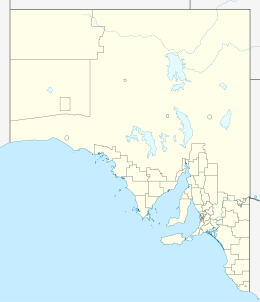Haystack Island
 Haystack | |
| Geography | |
|---|---|
| Location | Investigator Strait |
| Coordinates | 35°19′19″S 136°54′26″E / 35.32191°S 136.9071°ECoordinates: 35°19′19″S 136°54′26″E / 35.32191°S 136.9071°E |
| Length | 500 m (1,600 ft) |
| Width | 120 m (390 ft) |
| Highest elevation | 43 m (141 ft) |
| Administration | |
|
Australia | |
Haystack Island is an island located in Investigator Strait off the south coast of Yorke Peninsula in the Australian state of South Australia about 6 kilometres (3.7 mi) south-west of Stenhouse Bay. Since 1972, it has been part of the Althorpe Islands Conservation Park.
Description
Haystack Island is about 6 kilometres (3.7 mi) south-west of Stenhouse Bay. It is described as ‘a narrow wall of sheer cliffs, undermined, indented and marked by fresh scars and rockfalls’ and that ‘has been eroded to a series of tall lobes connected by thin necks of rock that narrow to an almost knife-edge ridge’. It is surrounded by a ‘fringing wave-cut reef’. The island is about 500 metres (1,600 ft) long by a maximum width of about 120 metres (390 ft) and with the tallest lobe having a height of 43 metres (141 ft). Its long axis is aligned in a north-west to south-east direction.[1][2]
Access is reported as best done in calm seas and that the summit ridge can be reached from the island’s east coast via a rubble cone of rubble, taking care when climbing the slope’s ‘loose and crumbling’ surface. A survey carried out in 1982 by the responsible government agency used a helicopter to access the island’s summit.[1][3] A number of sources consider Haystack Island along with the Althorpe Islands and Seal Island to be a group of islands known as the Althorpe Islands Group. [4][5][6]
Formation, geology and oceanography
Haystack Island was formed about 7350 years ago after sea levels rose at the start of the Holocene thereby separating Yorke Peninsula from Kangaroo Island.[7] Haystack Island consists of a seam of Bridgewater Formation calcarenite that sits on a largely submerged ridge of Gleesons Landing Granite.[6][8] Haystack Island rises from a depth of 20 metres (66 ft) within 300 metres (980 ft) from its southern shore.[9]
Flora and fauna
Flora
A survey carried out in November 1982 found 11 species of plants making up a shrubland covering the island’s ridge including Grey Samphire, Marsh saltbush, and Nitre-bush in the deeper soils, and Cushion-bush, Round-leaved Pigface and Southern Sea-heath in the shallower soils.[1][3]
Fauna
A survey carried out in November 1982 reported evidence of the presence of the following vertebrate animals - the White-faced storm petrel by the presence of ‘shallow burrows’ used during the ‘summer breeding season’, Pacific gull by the existence of a ‘large midden of shell fragments was found on the highest dome, indicating a feeding site…’, and the White-bellied sea eagle by the presence of a ‘maintained nest’.[1][3]
Protected areas status
Since 1972, Haystack Island has been part of the Althorpe Islands Conservation Park. Since 2007, it has been a prohibited area where access is only allowed by permit in order to protect the breeding population of seabirds.[10][11][12] Since 2012, the waters surrounding its shores are part of a habitat protection zone located within the boundaries of the Southern Spencer Gulf Marine Park.[13]
References
- 1 2 3 4 A.C., Robinson; Canty, P.; Mooney, T.; Rudduck, P. (1996). South Australia's offshore islands (PDF). Canberra: Australian Heritage Commission. pp. 287–288. ISBN 0-644350-11-3.
- ↑ A.C., Robinson; Canty, P.; Mooney, T.; Rudduck, P. (1996). South Australia's offshore islands (PDF). Canberra: Australian Heritage Commission. p. 500. ISBN 0-644350-11-3.
- 1 2 3 A.C., Robinson; Canty, P.; Mooney, T.; Rudduck, P. (1996). South Australia's offshore islands (PDF). Canberra: Australian Heritage Commission. pp. 445–451, 452 & 457. ISBN 0-644350-11-3.
- ↑ A.C., Robinson; Canty, P.; Mooney, T.; Rudduck, P. (1996). South Australia's offshore islands (PDF). Canberra: Australian Heritage Commission. p. 286. ISBN 0-644350-11-3.
- ↑ Pub175, Sailing directions (enroute) north, west, and south coast of Australia (PDF) (10th ed.). National Geospatial-Intelligence Agency. 2010. p. 183. Retrieved 16 May 2014.
- 1 2 Management Plan - Althorpe Islands, Goose Island and Troubridge Island Conservation Parks (PDF). Adelaide: Department of Environment & Heritage. 2009. p. 13. ISBN 978-1-921466-76-2.
- ↑ A.C., Robinson; Canty, P.; Mooney, T.; Rudduck, P. (1996). South Australia's offshore islands (PDF). Canberra: Australian Heritage Commission. p. 12. ISBN 0-644350-11-3.
- ↑ Fairclough, Martin C (December 2007). "KINGSCOTE Special 1:250 000 geological map" (PDF). MESA Journal. Government of South Australia, DMITRE. 47: 28–31. ISSN 1326-3544. Retrieved 18 May 2014.
- ↑ South Australia. Department of Marine and Harbors (1985), The Waters of South Australia a series of charts, sailing notes and coastal photographs, Dept. of Marine and Harbors, South Australia, pp. Chart 23, ISBN 978-0-7243-7603-2
- ↑ Management Plan - Althorpe Islands, Goose Island and Troubridge Island Conservation Parks (PDF). Adelaide: Department of Environment & Heritage. 2009. p. 1. ISBN 978-1-921466-76-2.
- ↑ Management Plan - Althorpe Islands, Goose Island and Troubridge Island Conservation Parks (PDF). Adelaide: Department of Environment & Heritage. 2009. p. 28. ISBN 978-1-921466-76-2.
- ↑ A.C., Robinson; Canty, P.; Mooney, T.; Rudduck, P. (1996). South Australia's offshore islands (PDF). Canberra: Australian Heritage Commission. p. 146. ISBN 0-644350-11-3.
- ↑ "Southern Spencer Gulf Marine Park, Management plan summary" (PDF). Department of Environment Water and Natural Resources. 2012. p. 2. Retrieved 13 July 2014.